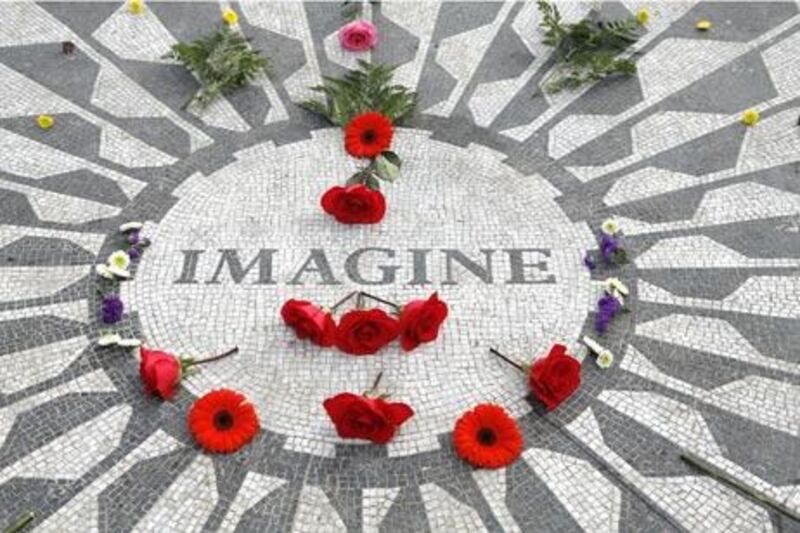"It's still difficult to hold back the tears," says Jerry Rubin, who, like many devotees of the British pop icon, John Lennon, is today holding a candlelit vigil to mark 30 years since the murder of Liverpool's most famous peacenik, artist and rocker.
"He was loved by so many people in so many ways," added the 66-year-old, who has marked December 8 each year for three decades. "A musical genius, a person who was growing and evolving, his politics, how he spoke his mind as a free and natural person.
"And the tragic way he was shot down, as a young man, in front of his wife in the street."
The crowds gathering in Lennon's birth city of Liverpool, near the site of the shooting in New York, at Rubin's remembrance in Los Angeles and other cities around the world bear testament to a legacy that still resonates today.
Liverpudlians will lay flowers beside the new Peace and Harmony monument. New Yorkers will congregate at Lennon's favourite spot in Central Park, near the apartment he shared with his wife, Yoko Ono, until he was shot outside the Gothic apartment block.
In the years since his death, Lennon, born to working-class parents and raised by his aunt, Mimi Smith, has garnered peculiar accolades, from the John Lennon Peace Crater on the moon's dusty surface to an eponymous airport serving Liverpool.
For two hours each night between Lennon's birthday, October 9 (he would have turned 70 last month), and the anniversary of his death, December 8, the Imagine Peace Tower, near Reykjavik beams a piercing blue light into the sky over Iceland.
The legacy translates into cash. A gold-braided military jacket worn during a 1966 Life magazine photo shoot beat the expectations of Julien's Auctions when it went under the hammer in Beverly Hills on Sunday and netted US$240,000 (Dh882,000).
The former Beatle's longevity derives partly from the staggering popularity of the band he originally formed in the late 1950s - a group that the US president, Barack Obama, said this week had changed "the way the world thought about music".
The Beatles were identified in a recent poll as the historical act that 22 per cent of Americans say they would most like to see strut their stuff on stage, ahead of Michael Jackson, Frank Sinatra and even the prolific 18th-century composer Wolfgang Amadeus Mozart.
Last month, the band sold more than two million individual songs and more than 450,000 albums worldwide in the first week of their back-catalogue's release on iTunes, following years of negotiations between the digital music retailer and the rights holders.
Lennon's popularity has spawned movies, from Backbeat's enactment of the early Hamburg days and his friendship with the "fifth Beatle", Stuart Sutcliffe, to the childhood chronicle of Nowhere Boy and the Two of Us account of a 1970s reunion with his erstwhile band-mate and collaborator McCartney.
The musical Rain: A Tribute to the Beatles, draws Broadway crowds despite negative reviews of "enhanced karaoke". Bookstore narratives range from hagiographies to hatchet jobs - pop music's antidote to apathy or the saga of an abandoned child who deserted his own son, Julian, and brought misery to others.
The current glut of Lennon documentaries focuses on the final year of his life and the day he was killed by a deranged fan, Mark Chapman - who is serving a life sentence at a high-security prison after pleading guilty to second-degree murder.
In one, a doctor from Manhattan's Roosevelt Hospital describes a heart-wrenching scene of Ono bashing her head against a concrete wall following news of her husband's death. New York police officers describe arresting an apologetic, "heavy-set man" casually reading JD Salinger's The Catcher in the Rye in front of the Dakota apartments.
Julian Lennon tells of the tearful moment he shared with Sean, the son of Lennon and Ono, after the killing, saying: "It reminded me of something… this was going to be tough on a little boy that had a great deal of love going for his father."
Some look at the city Lennon and Ono fled to in 1971 to escape a hostile British press. In the Ono-approved documentary, LennoNYC, the Japanese avant gardist says her late husband "should have been born in New York". Lennon once said that in Manhattan he was "known enough to keep my ego floating, but unknown enough to get around".
Some question Lennon's commitment to peace activism. The Georgia academic, John McMillian, describes a "fleeting and capricious" streak of pacifism that began with the late-1960s bed-ins with Yoko and abruptly quietened in 1972 as he sought to remain in the US.
But to the Lennon peaceniks, the wire-rimmed spectacles and shoulder-length hair will forever symbolise a man who promoted peace.
Rubin has no doubt that his hero would have attended "every anti-war rally since Vietnam".
"The words that John Lennon said in that classic song, Give Peace a Chance, are immortal," he says. "That is something we have never really done and it's time to do it. Even giving peace half a chance would be good enough to get things started."
* James Reinl






